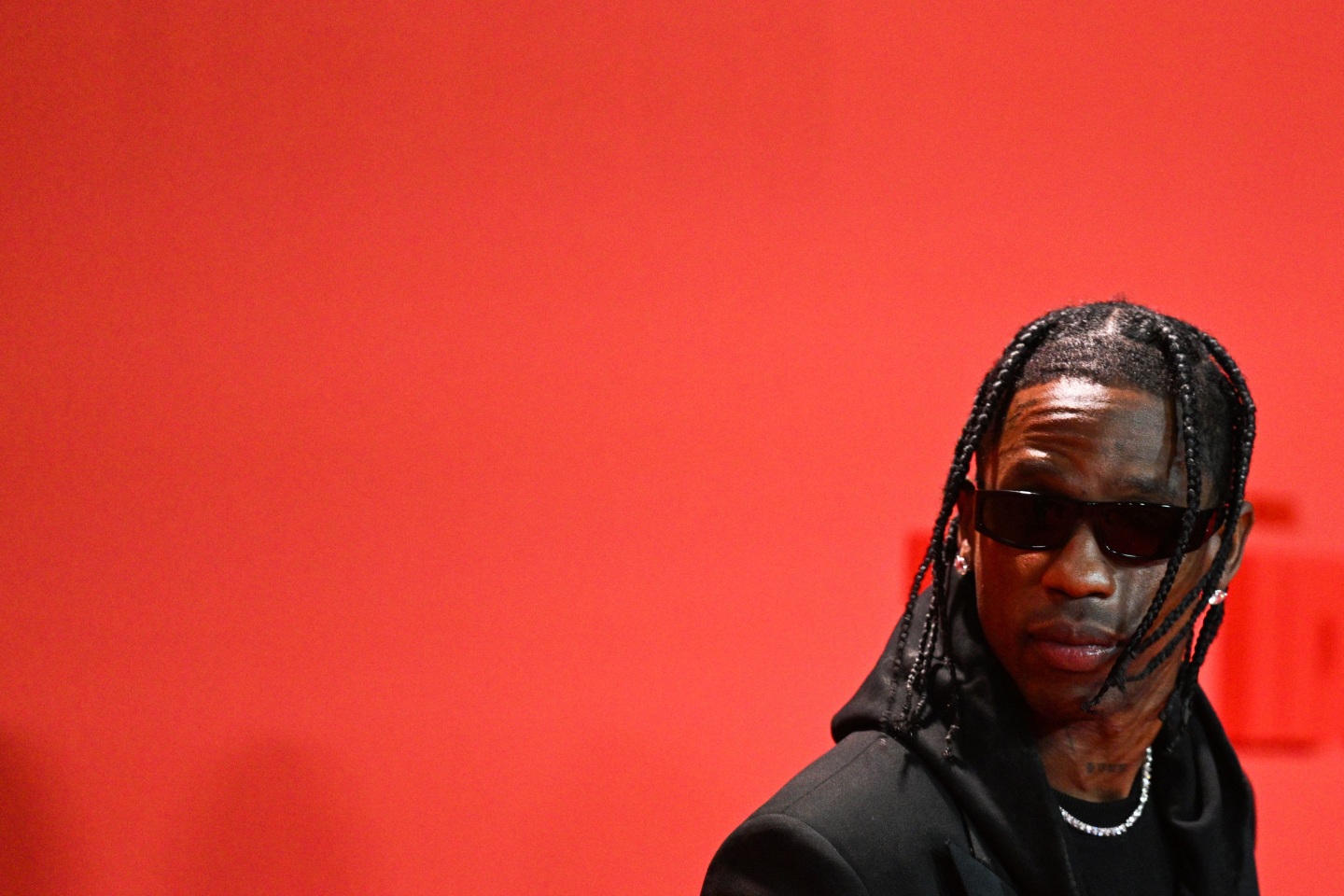A disputed letter, a controversial syndicate, and “strange rituals”: Behind the collapse of Travis Scott’s Pyramids show
The reveal of Travis Scott’s fourth album Utopia was supposed to come with a performance at the Pyramids of Giza. The Musicians’ Syndicate led the charge in having the show canceled.
 Travis Scott. Photo by PATRICIA DE MELO MOREIRA/AFP via Getty Images
Travis Scott. Photo by PATRICIA DE MELO MOREIRA/AFP via Getty Images
Last Tuesday (July 18), a group little known outside of Egypt caused a stir around the world by declaring the cancellation of Travis Scott’s concert at the Pyramids of Giza, where the rap superstar was set to unveil his fourth album, Utopia. Mohammed Abdullah, a spokesperson for Egypt’s Musicians’ Syndicate, said in a statement that his organization scoured social media for information on Scott and discovered “peculiar rituals performed” on stage, “contradicting our authentic societal values and traditions.”
Confusion reigned for hours, even after Live Nation insisted that the concert would continue as planned. After days of uncertainty, on July 26, Live Nation announced that the show would be canceled, citing "complex production issues." The Musicians' Syndicate was never directly mentioned in Live Nation's July 26 statement, but it's hard to ignore the Syndicate's possible role in the cancelation. So, the question still lingers: does the Syndicate have the power to ban such a concert?
The short answer: it’s complicated.
The Musicians’ Syndicate plays a more perfunctory role adjacent to the government, motivated by a desire for the purity of the Islamic state. The organization enforces its ideas of “morality” through strict regulations on the values contained within music and restrictions on art that is seen as vulgar and straying from Egyptian tradition. Hip-hop is not their sole focus: in 2017, Lebanese indie-rock group Mashrou’ Leila were banned by the Musicians’ Syndicate in Egypt after a fan raised the Pride flag during their performance at Cairo Festival City. The performance led to the arrests of 33 people, with five being forced to engage in anal examinations, according to Amnesty International. Sarah Hagazi, the LGBTQ-identifying fan who raised the flag, was forced to flee to Canada in 2017 after a campaign of state persecution. In 2020, she took her own life.
One way that Syndicate has had the power to “ban” performances is through fines levied against artists who might not have the financial capacity to pay them. Wegz, an Egyptian rapper and one of the most commercially successful rappers in the Middle East, refused for six months to sign an agreement with the Syndicate that would have censored profane lyrics in his performance. He relented this year and signed, performing a show on June 23 in New Cairo after paying the Syndicate a 200,000 LE fine and 15,000 LE to renew his permit. Abiding by the terms of the agreement, Wegz’s recent concert went ahead without political complications; he’s now preparing for his first international tour.
One way that Syndicate has had the power to “ban” performances is through fines levied against artists who might not have the financial capacity to pay them.
The Syndicate’s rules for Egyptian artists extend beyond the country’s borders, and local artists who refuse to agree to their terms can be fined even if the show does not take place in Egypt. Without obtaining any permits, Wegz became the first Egyptian artist to perform at the World Cup’s closing ceremony in Qatar but faced a fine of 50,000 LE for the performance upon his return. A similar penalty was placed on other prominent figures within Egyptian trap, with Marwan Pablo receiving an equal fine for “offending his [Egyptian] audience,” yelling at his band and storming offstage after reported technical issues; Alexandrian rapper Afroto received a heftier fine of 100,000 LE for using backing tracks rather than performing with a preapproved 12-piece band.
Fines are only one tool the Syndicate uses. In 2015, then-Minister of Justice, Ahmed al-Zend, issued judicial self-policing powers to the Musicians’ Syndicate, giving its board members the rights to “issue warrants against people implicated in a crime that falls under the artistic syndicate's law, conduct searches and arrests, accept complaints and reports from citizens, prepare minutes, collect information on the suspects, and send reports directly to the prosecution.”
This was a significant tool in the Syndicate’s war on mahraganat, Egypt’s most popular form of music. The term directly refers to “festival music,” featuring both traditional Egyptian instrumentation mixed with early-2000s electronica. The Musicians’ Syndicate banned mahraganat from private venues in 2020. Mahraganat artists like Omar Kamal and Mohamed Ramadan have been barred from performing in Egypt; if they do sign an agreement with the Musician’s Syndicate in order to perform in Egypt, they’re grouped as shaabi (locally popular) singers. The purpose of this reclassification is two-fold: to reduce mahraganat’s visibility (a stated intention of the Syndicate) and vilify what the Syndicate’s president Hani Shaker believes to be “low-brow art,” an attempt to reduce the cultural significance of mahraganat in the eyes of the Egyptian people. To that end, the Syndicate stopped issuing permits for mahraganat shows in 2022.
In a statement to the FADER late last week, Tarek Mortada, the media advisor to the Egyptian Musicians’ Syndicate, said that if Travis Scott had proceeded with his performance at the Pyramids, he would have been going against Egyptian law: “The show has been canceled with the decision of the Musicians’ Syndicate. Even if [Travis Scott] received the proper licensing, the Department of National Security has the right to cancel the show if they don’t approve, as well. That’s the law.” When asked last week if the concert could still take place, Mortada repeated: “This is a land of law. Everyone needs to respect the law and respect the rules as long as they’re on Egyptian soil.”
He added: “When Egyptian public opinion began discussing the culture that [Travis Scott] is promoting, it reflects the opposite values of Egyptian culture and the Arab region. From there, we started researching and found out what the public and the media has said is true. He has controversy in America and the values are not deemed appropriate by traditional Egyptian culture.”
Egypt is majority-Muslim country with little-to-no mosque-state separation. Hip-hop and African-American culture receive little empathy in the region, and Scott is in some ways emblematic of this. The Astroworld tragedy, where a crowd surge at Travis Scott’s 2021 festival killed 10 attendees, led to a surge in Satanic panic with Scott as its target. Amr Abdelsalam, leader of the lawsuit against Travis Scott’s performance at the Pyramids, cited the Astroworld tragedy as evidence of Scott’s Satanic rituals. In the same vein, Afrocentrism is considered heresy by some Egyptians who see any acknowledgement of non-Arab ties to the country as a distortion of their image.
Foreign rappers have performed at the Pyramids sporadically over the years, with acts like the Black Eyed Peas and Russ taking the stage, but they’re exceptions to the rule. The government’s hesitancy towards hip-hop could be chalked up to a fear of the political impact of free speech and the development of new streams of income for artists, which may engender a newfound sense of autonomy for Egypt’s long-disenfranchised youth. Together, both may help change the fabric of Egyptian culture and its preconceived hierarchy. In an interview with Vox addressing the power of Egyptian trap music, Yasmine El Rashidi, author of Laughter in the Dark: Egypt to the Tune of Change, elaborates: “There’s so much that’s said that isn’t overtly political, but it is political. When you talk about economic circumstances and the sense of [young people] feeling very stifled by the country — when you speak about those things, you can’t really separate them from politics, even if you’re not directly addressing the government.”
While the Syndicate has some legal jurisdiction and significant political clout, the majority of their power comes from the intentional obfuscation of their authority.
In speaking with a number of sources (who asked for anonymity out of fear of political reprisal), a common theme emerged: while the Syndicate has some legal jurisdiction and significant political clout, the majority of their power comes from the intentional obfuscation of their authority. This lack of transparency extends to the details of the permit negotiations, which have not been revealed publicly.
In fact, the Musicians’ Syndicate’s legal authority is not unique within Egypt. In a televised interview with MBC Masr, Syndicate spokesman Mohammed Abdullah detailed two additional organizations within Egypt that issue permits for concerts and fines if the concert takes place without one. “Anyone who does a concert needs to obtain three permits: the first being from the Syndicate, [the second] from the Ministry of Arts and Culture, and if they’re foreign, there needs to be approval from the Ministry of Manpower.” If the Musicians’ Syndicate, Ministry of Arts and Culture, and the Ministry of Manpower deny said permits, Travis Scott will be subject to fines from all three sources. Speaking with The FADER, Abdullah said that Scott’s concert could not have taken place at all without approval from yet another branch of the Egyptian government. “They have to receive Department of National Security approval, otherwise the show will not take place.”
In the afternoon of Thursday, July 19, Lamees Elhadidi, a news anchor aligned with the Egyptian government, shared a statement purportedly written by Travis Scott. In a slightly groveling tone, the letter acknowledged that the Utopia show’s permits had been withheld, and said that unless Live Nation were granted access to the concert site by Thursday evening, it would have to be postponed. The authenticity of the letter is in serious doubt — neither the Syndicate nor Scott’s camp have commented on it.
Whether or not the letter is authentic, few would stand to benefit more from its dissemination than the Musicians’ Syndicate. It would be a messaging coup even greater than the initial confusion around the Utopia show. And with the show's official cancellation, the Syndicate, rightly or wrongly, will be ascribed a significant role in the decision. If the Syndicate can successfully appear as gatekeepers for even the world’s biggest artists, Egyptian musicians could begin to wonder what their odds of standing up to them are.
